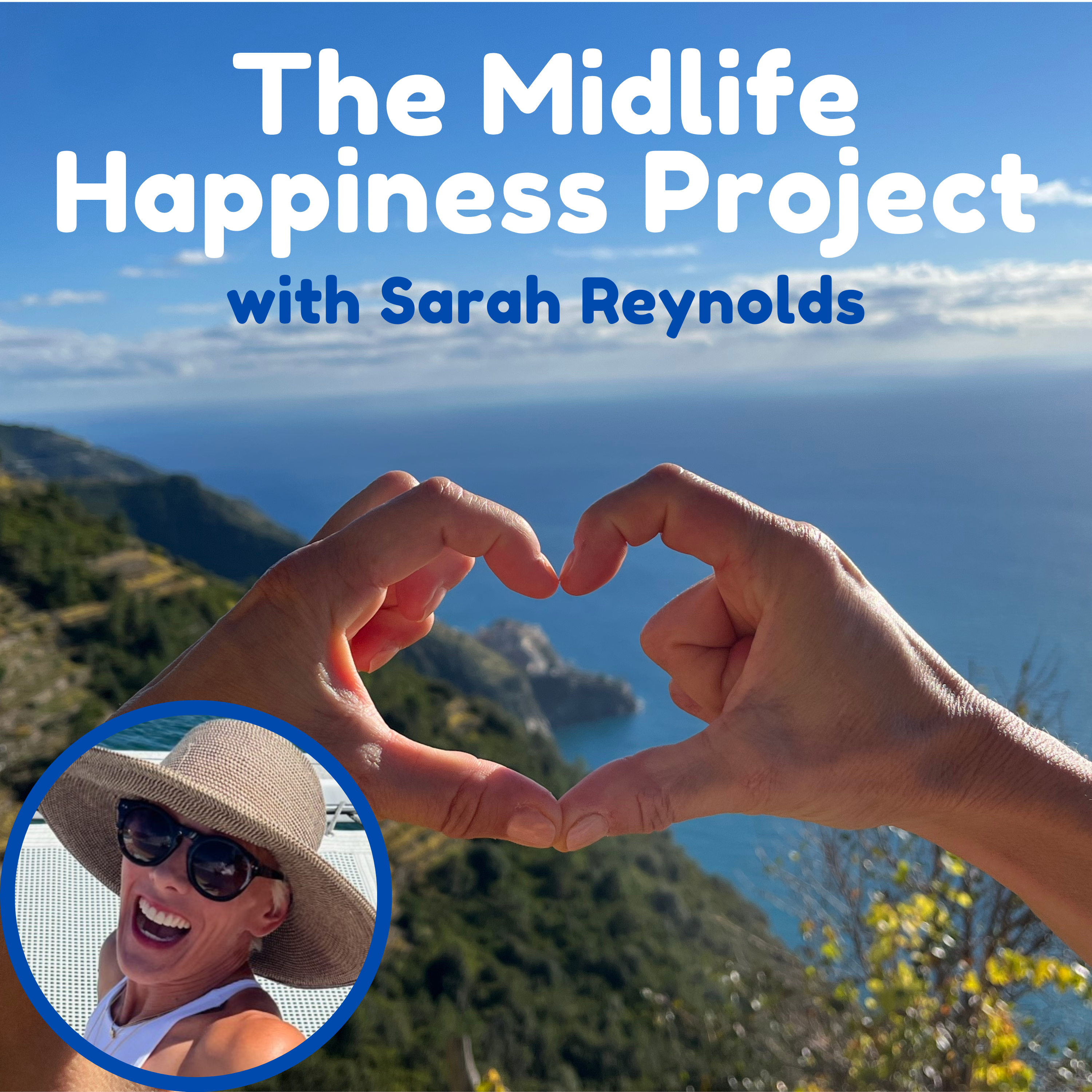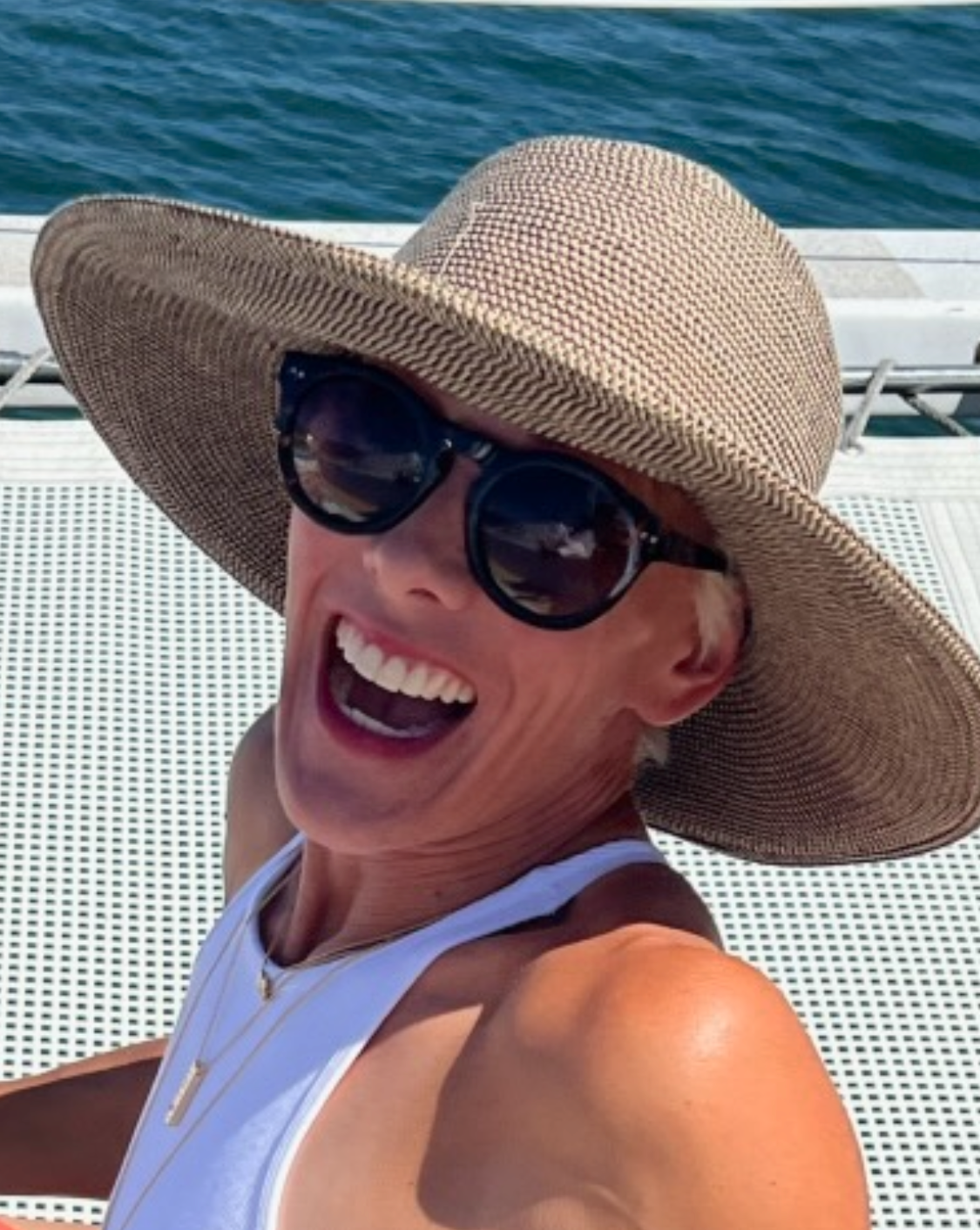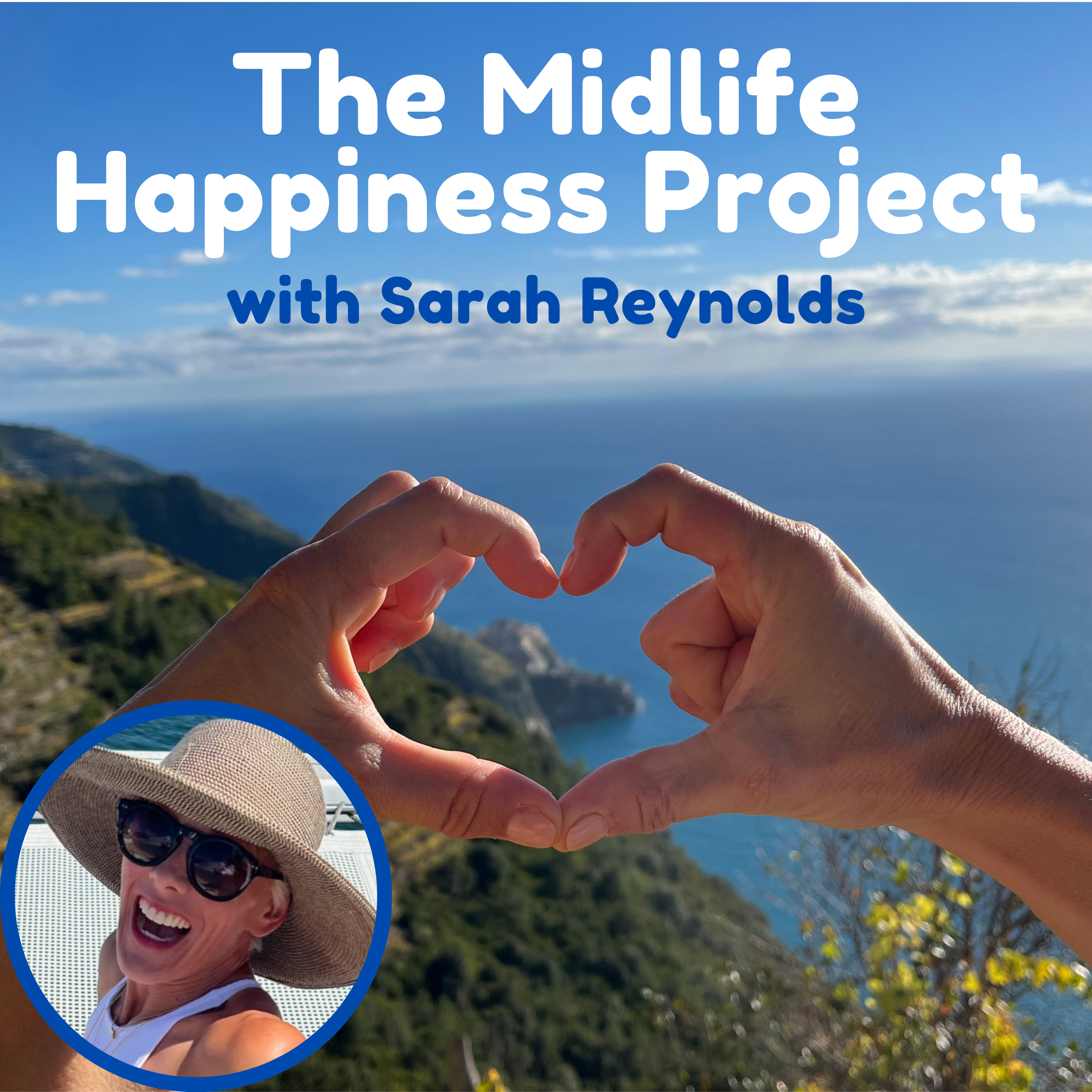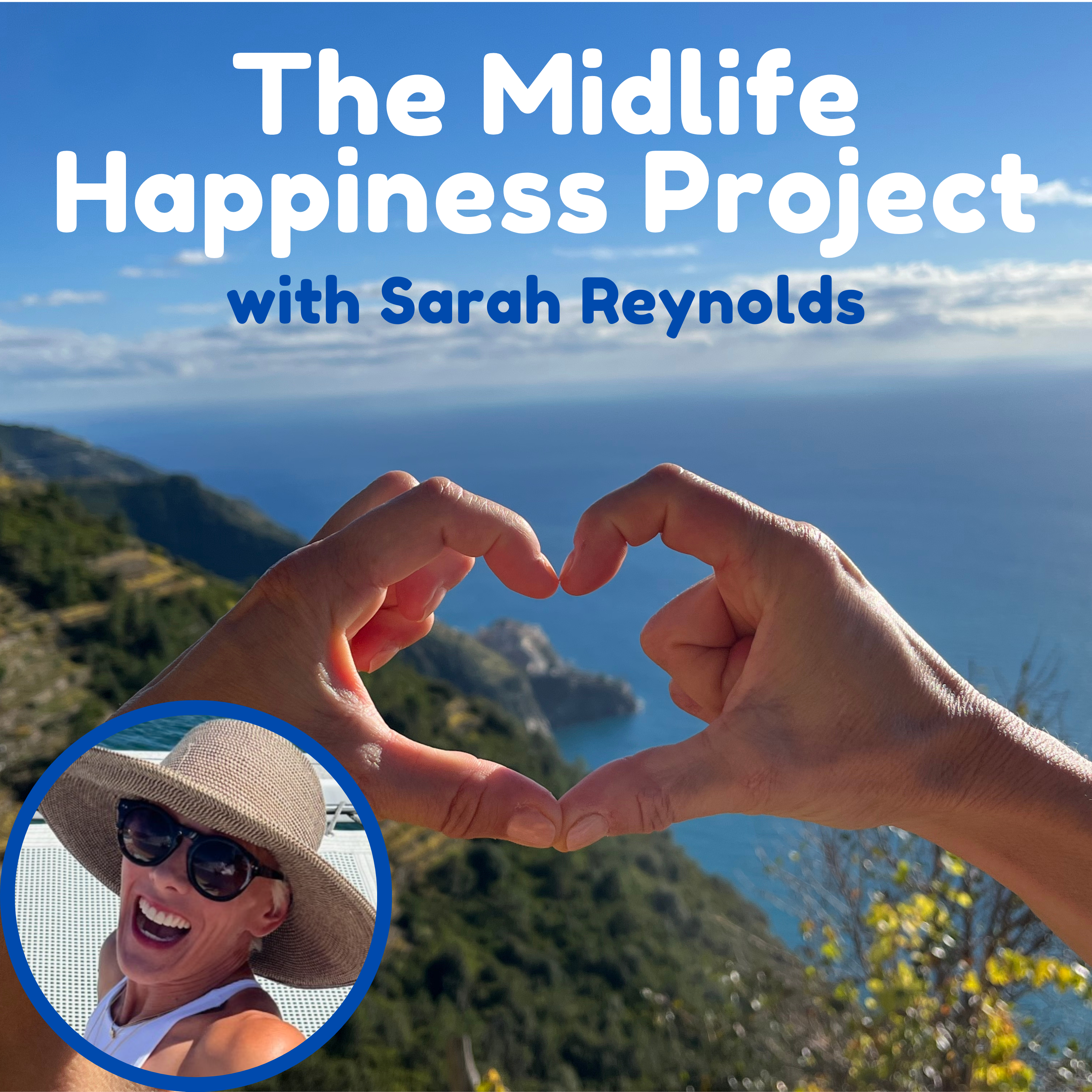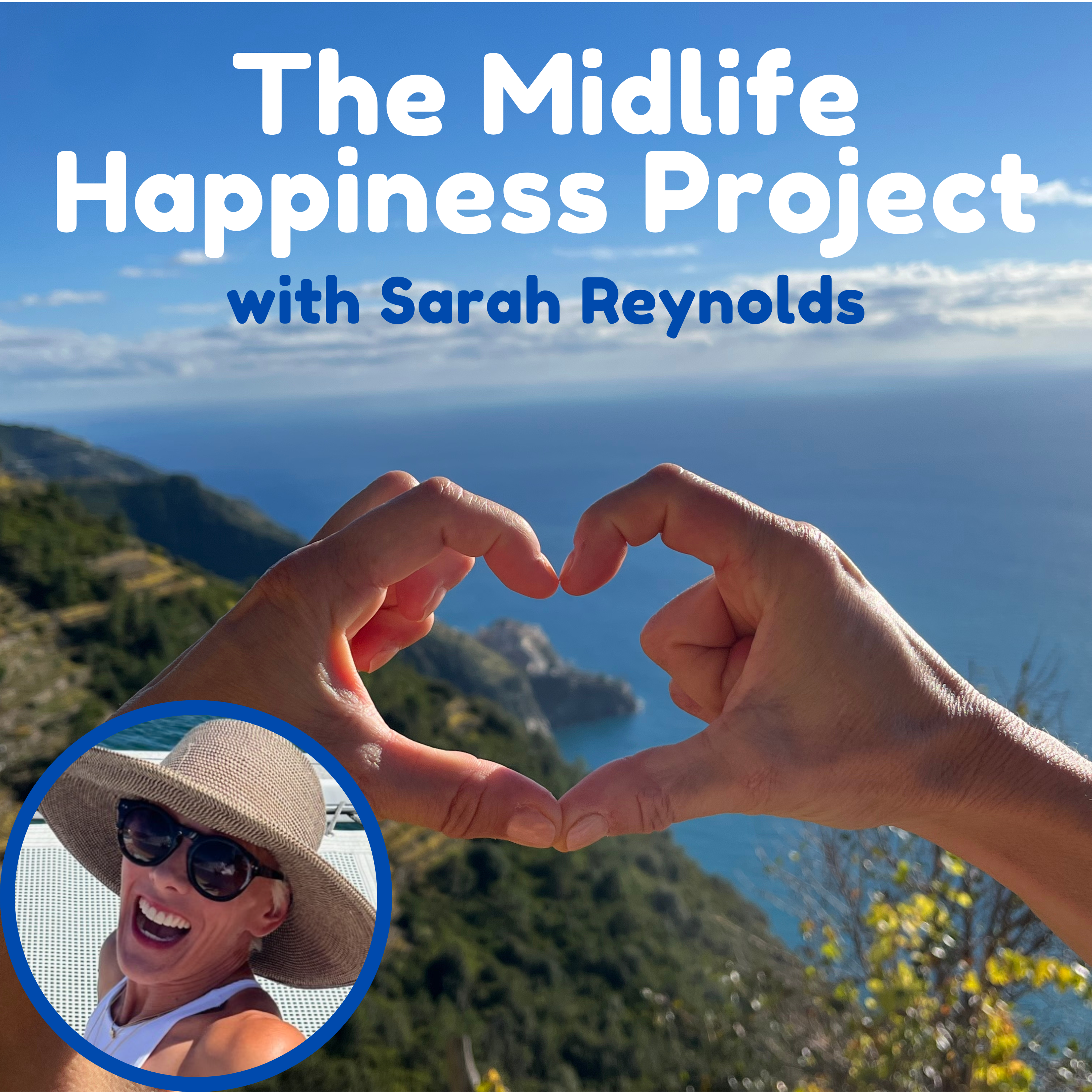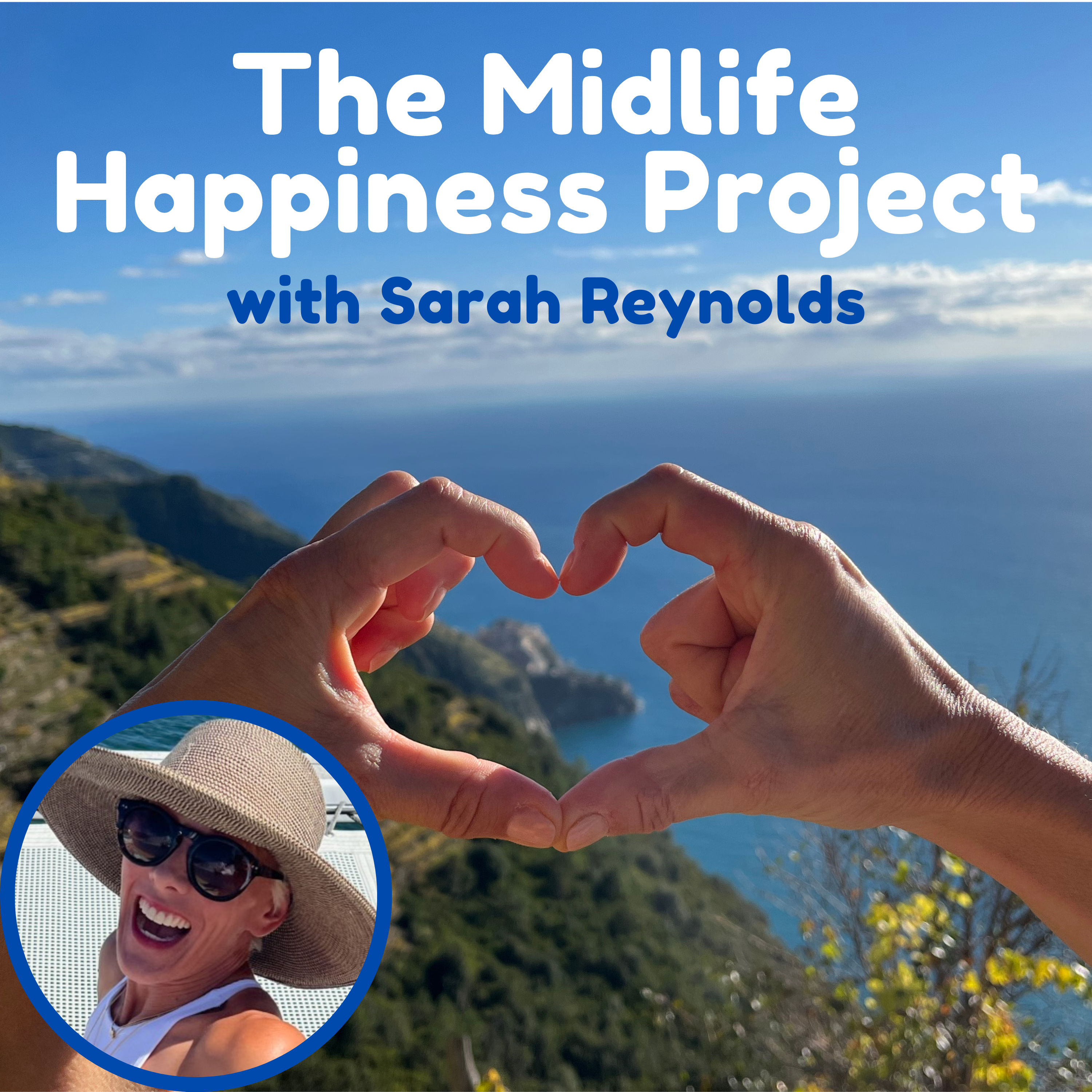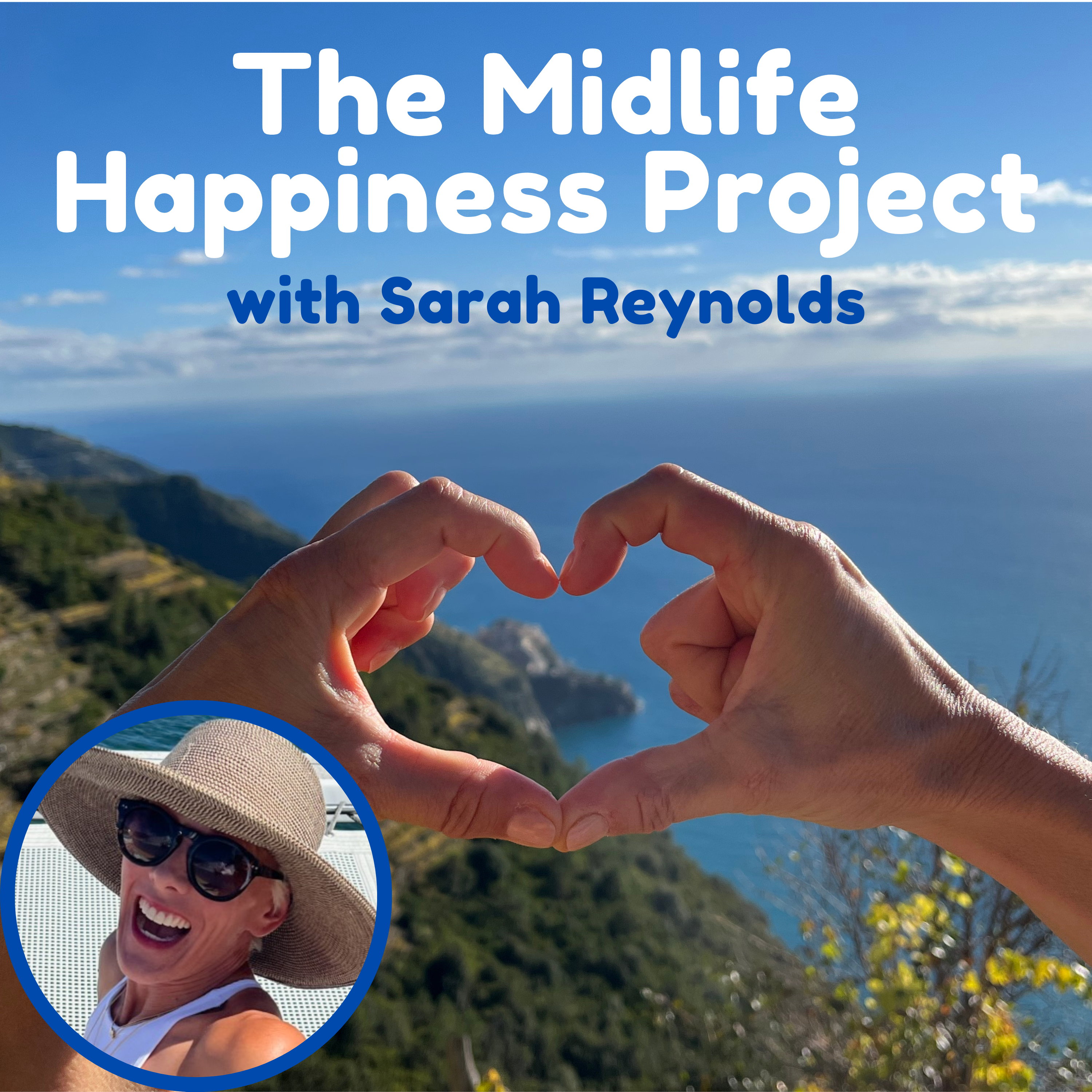Episode Transcript
[00:00:00] Speaker A: Hi there, I'm Sarah, and welcome back to the Midlife Happiness project. Today I am super psyched to introduce you to a friend of mine who is doing something that's really exciting. He left his corporate job in Silicon Valley, left it all behind to do, of all things, start a podcast. You guys are really going to want to listen to this one.
Welcome back to the Midlife Happiness project. And today I have another great guest. His name is Kush. Welcome to the show, Kush.
[00:00:45] Speaker B: Good to be here, Sarah. Thanks for having me.
[00:00:47] Speaker A: Absolutely. So, as a little intro, Kush lives in San Francisco. He has had a long, successful career in tech. He's worked at companies such as Deloitte, PayPal and Airbnb. He is also an experienced rock climber and surfer and has climbed and surfed at amazing places all around the world.
And Kush, just recently as of last year, made a pretty dramatic career pivot, and he changed course from the corporate rat race and is doing something really, really inspiring. And on that note, that thing that we always talk about that has inspired him and really added happiness to his life is what he's going to share with us today. And Kush, what is that thing, that thing that you've introduced to your life that's really made you happy?
[00:01:52] Speaker B: Well, thanks for the intro. I have started this new venture which brings together, I think, all my gifts and allows me to share some things I've learned and some areas. I've been lucky to partake in the into this podcast and for some background along with this career I've had and, you know, formal schooling and whatnot. I was lucky enough to have started playing in the outdoors since I was young. I grew up backpacking in the Himalayas and that led to embracing rock climbing as a young adult. So I've been lucky to have climbed in beautiful places all over. And then I picked up surfing when I moved to San Francisco about 17 years ago.
And I realized a couple of things. One is that there are people out there, incredible athletes doing amazing things, people that have inspired me, and I wanted to bring out those stories for the everyday person and keep pushing them to keep chasing their dreams.
The second thing that happened was in the last couple of years, I realized I was getting older and I was hitting mental and physical blocks and I was looking to be inspired myself. And I was like, well, is there a podcast that brings out stories of people continuing to push their limits against aging? And I realized, well, there isn't one. And I needed to go and start one. So that led to me taking some hard decisions and realizing that if this is something I want to do, I need to start it now and not getting younger and, you know, when, you know, the iron's hot, you've got a, you know, you gotta go out and meet it.
[00:04:07] Speaker A: And, well, what I like about your story, too, it sounds like, you know, it's one thing to dabble, right, and to sort of say, oh, this is gonna be sort of a little side gig. I do. But by the sounds of it, I mean, you just went for it headfirst, and you said, if I'm going to do this, I'm going to give it 100%. So what led to that decision? Because that's a big risk right there.
[00:04:37] Speaker B: You know, it wasn't quite as dramatic in hindsight. Sometimes it seems like, yes, I have been. I'm doing it full time now, and I'm maybe more than full time, but I recorded the first couple of episodes a year and a half ago when I still had a full time job.
But then I could not get together all the technical infra to get it out to the public, and I found myself at, you know, for lack of a better word, at these crossroads. I left my last job about nine months ago, and when traveling with my, my good friend, and while I was doing that, I just realized how much I enjoy being in the outdoors and discovering places in Peru and Bolivia and in Thailand and climbing all over. And that idea just kept gnawing at me. So when I came back around thanksgiving last year, I realized this is such a good point for me because I could have jumped right back into, you know, the job space, or I could have done this. And I realized, you know, I can always go back into this world. I've been in tech and the corporate world, but this is such a good point for me to see if I can put some time and energy into doing this. And when I actually put out those first few episodes, I just got really good feedback and validation from good friends and people who listened. And I'm like, you know, let me. Let me actually give this a go. I think more than anything else, this was helping me, this work with bringing out these stories and interviewing these athletes. Sometimes I'm reading books about people who have climbed El Capitan. Sometimes I'm reading books about people doing first wave Pixar discovery in the Arctics. And this is what I do in preparation for these podcasts. So I'm like, wait a second. I'm working a lot, but I'm doing the same thing that I would have done in my spare time, if I had a full time job. So a combination of, let's say, deep interest and fun and a tiny bit of financial security that allows me to live, let's say, a more budgeted life, but a very full life because I get to do what I want to do with my time. I think that's what's manifested, what's really interesting.
[00:07:07] Speaker A: There's two things at play here, right? Your podcast inspires people. And yet also the genesis for this podcast is you yourself want to be inspired. And so that's probably, you know, your good, you know, way of assessing a show in an interview. If you think, well, I'm, if I'm inspired by this, others must be inspired. The other thing I like about what you're talking about, we've had conversations with past guests about this, which is really fascinating, which is, I think, as people get older and they're thinking about trying something new, mixing it up, doing something different, to really sort of inject some excitement into their life, immediately think it has to be something new. And what you're speaking to and other people have spoken to us about is that doesn't necessarily have to be the case. It can be something you've done, like since childhood, something you've done your whole life. Except now, maybe rather than just do it as you've always done it, do something different. Maybe challenge yourself. If you've always been a runner, I don't know, try running a marathon. If you've always been a tennis player with your girlfriends or, you know, your friends, why not join a team so sort of punch it up a level? It doesn't necessarily have to be a case of you reinventing your life, but just repositioning it or reinventing that a part of it, but still accessing the same interests that you've always had your whole life.
[00:08:56] Speaker B: I think that's totally accurate. It is about leaning in into those quirks or those things that light you up. And for me, this was my penchant for the beautiful outdoors, but it could be something else for somebody else. But the other thing I want to add is it's not just beyond just doing that to a higher intensity. It is also bringing, for me, let's say, all my faculties, like maybe even things I've learned in my life as a tech entrepreneur, which is about, hey, this is a product. This is a market. This is how you serve the market while still saying authentic to your product, to your vision.
It is doing what you love, but also doing it with that ability to build something that serves a greater purpose than just me out there, you know, climbing Yosemite or whatever, which still brings me more fun than anything else. But now I've done it, you know, for, like, a lifetime. So now it's fun to actually share it with others.
[00:10:14] Speaker A: Okay, so you've now made the decision. Let's go back. You've made the decision. It's been mulling around in your head. This is something you want to do. You've got very clear focus. You know, exactly this podcast you want to make. Describe for us that first interview, the day that you really. It all came together. And this is real now, and you are making a podcast. You are a podcast host. What was that like?
[00:10:44] Speaker B: It was a little bit scary, like anything else you start off with. But maybe for me, podcasting seems to come a bit more naturally, as people would tell me or my family would tell me that I don't mind holding attention, I don't mind having the megaphone, so to speak, so it wasn't scary. I think the other thing that I think what you said earlier was, I actually wanted to have these conversations because for me, this is this extraordinary opportunity to sit down with my heroes for a couple hours and ask them anything I want. So I'm like, oh, my goodness. These people that. That have inspired me for decades, I get to do this with them. So I think once I remember that part that I'm doing this for myself, and if I stay authentic to that and I ask them things that I'm genuinely curious about, it makes me.
Yeah, it takes away the, you know, the butterflies or the nervousness or.
And I think the second thing also is it's also an area that I am quite familiar with. Had I taken up, let's say, had I maybe, I don't know, started a podcast on something, I don't know, home improvement, right. I would have sucked at it because I really would not have known. I would have been very robotic, I think. But, yeah, I think with this, it's great because I can be myself, and I can generally and will look myself in the conversation.
[00:12:29] Speaker A: And the subject with all of these athletes, would you call them extreme athletes? Would that be the term? What's the title you would give the average guest that you have on your show?
[00:12:44] Speaker B: These niche outdoor sports, I think, are often misunderstood because the medium feels scary to the average person who is just looking to get outside and get some sunshine. And I think that's amazing, too.
Them people who are able to push themselves to extreme limits with rock climbing or mountain biking or surfing, whatnot. But the sports itself may not be extreme. I think, as one understands, I think. I think playing football or playing soccer or some other things are, you know, just more dangerous and more accident prone on a, you know, on a, let's say a per event basis, these sports happen outside, but they're often quite safe if one does them correctly. Some ends of these sports, like we talked about base jumping for a second. So some of those sports certainly are more risk prone than others. But like many things, like, but many things in life, you know, I mean, if one works a normal 40 hours a week, that is fine, but if one starts working 100 hours, that's probably a more extreme way of being workaholic.
[00:14:00] Speaker A: Out of all these athletes that you have interviewed, is there one shared perspective that they all seem to have about how pursuing this athletic adventure, let's say that it's added real happiness or it's been rewarding to them, is there one thing that they all share?
[00:14:32] Speaker B: So I think, first and foremost, I think the act of practicing their sport, I think that brings them a lot of joy being out and surfing. Even if the waves are like 60ft or they're 6ft, being out there and practicing their sport, I think that gives them that very foundational joy. The other thing that I also found is committing fully to what they're doing. So I spoke with Gary Linden. He's a big wave surfer and one of the world's first or best surfboat shapers. And one thing he kept talking about is the act of going out and surfing every day. He's 74 now, and he still surfs big waves.
And he talked about how it is so important to him to go out because that's his practice, that's his exercise. But more than that, that's his meditation and how he has prioritized that. So he has a family, he's got two kids, he's lived and traveled all over the world. But that basic act of taking his surfboard, going after a surf check, going in, even if the words, even if the waves are crappy, and getting his few waves, I think that is such a important part of his daily practice. And I think that is one quality that I found with all the surfers, all the climbers, all the ultra runners, especially these people who have been doing it all their lives, and they continue doing it as they get older, is the habit of consistency and of making.
[00:16:16] Speaker A: I like your word, committing to it. We just interviewed somebody last yesterday, and that came up again that anytime you start something new, a, you have to be prepared to fall flat on your face 100%.
But you also, you know, you have to be realistic. Anytime you try, you know, something new. You have to get over this hump. These people obviously have been doing it their whole life, but even then, you have to commit to it to really get the benefits of it.
You know, it's one thing to dabble, but the more you put into something, the more, you know, you get out of it. And the other thing that I think is worth mentioning about, you know, your podcast, and I'm sure a lot of the guests on your show, is this. Not only this idea that you have to give, you know, a hundred percent, but this idea of that embracing something and giving it your all and not necessarily having.
Although I guess if they're competitive, that's one thing, but not so much as having your eyes on the end game, but just appreciating the process of it. Right. You have to love the doing of it. If it's all about winning, I would think that would sort of suck the joy out of it.
[00:17:57] Speaker B: I think that's 100% true. And I think whether it's these sports that these people do, and for them, it doesn't matter if they are undertaking, like, a hundred mile ultra run across the Rockies or they're just going for a run by the trail, by the house. I think they love just putting that one step in front of the other. I think that's fundamentally satisfying. And it's funny, I even find that about this podcast, maybe you as well, which is, I like doing all of these little bits, even the, you know, even the drudgery bits. Like, I like preparing, researching. I don't mind the editing either. Like, I will sit up late nights and listen to the. To the show for.
For a few hours. And for me, that's great, because I think it's cool that I created this. This is something that I like doing. This is something that is teaching me new things, and it's totally fine. I mean, I would enjoy that. Even when I was in the corporate space, if it's a project that I really enjoyed something that I was creating, there would be those sparks where I wouldn't mind setting up. You know, those are required, too, as, you know, like the occasional weekend and sometimes the late nights. But. But in that. In that spectrum between, like, let's say, tedium and passion, you know, it wasn't always passion. It was often tedium. While in this case, yes, there is some tedium as well as you, I'm sure, you know, but there's often.
Yeah, it's often great. Like, I don't mind that because it's something that I'm building. I'm creating it.
[00:19:41] Speaker A: Exactly. It's yours. You own this. This is your baby. You. Had you not done this, it simply wouldn't exist in the world. And I'm an artist, and it's a similar sort of thing that when I finish something, it's. I've really given birth to this thing. You've created it had you, not you and you alone made this thing. It's very empowering, actually, and very satisfying, rewarding, which of course, going back full circle, that's such a huge part of being happy.
And on that note, I did want to ask you specifically, since creating and being so successful at this podcast thing, how has it impacted your life in a positive way? Put another way, how specifically has it made you happy? Has it affected, perhaps, relationships with other people, your perspective on the world, mind, body, spiritually, in any way you want to talk about? How has it made you happy?
[00:20:54] Speaker B: Well, firstly, thank you, but I'm not so successful yet. I'm just another newly minted entrepreneur, if you may.
I think one of them, one of those things is the fact that it allows me to bring my whole self.
Like it's. There's no longer like, you know, this is my work life and this is what I do for fun and all of these like, little walls, this is what I do and this is what I do for fun. And I, if I'm at a party in San Francisco, I can tell them this is what I do. Or if I am rock climbing in the and boulder. A few weeks ago I told them this is what I do. So I think it just reduces this cognitive confusion. There isn't none of that. Like, this is what I do. So this has been hugely simplifying. The second thing, actually, it's funny, it's maybe a bit more cute, which is, I think it's evolving my relationship with my parents.
It's so funny because, you know, our parents want us to be happy, right? And that's universal. And what's also universal is we want to make our parents proud. And, you know, my parents have often struggled with my predilection for these quote unquote extreme sports and whatnot. And now that I can actually demystify these things and present them in a way that is more consumption friendly for the everyday person. And my folks are my biggest fans. So they listen to my podcast and they'll go back and watch it on YouTube later and they will even share it with their own friends. And it's one thing if you share something once because, hey, this is my kid and they are doing it. But I see my parents repeatedly sharing things with their friends because I think they genuinely are enjoying it and they're getting maybe good feedback from their friends as well because they're like, their friends are enjoying it. So for me, that's been one of those unexpected rewards, which is when I speak with my parents, whatever, every week or so we are talking about what they liked and what I should do differently and who should I be talking to next. So it's been fun.
[00:23:15] Speaker A: That is fantastic. And yes, I can relate to that. When we started this podcast, I think my mother was the only listener and sent it to all of her mahjong friends. So I was like, hopefully it expands beyond that, but I can fully, fully appreciate, and I love your story, Kush. I think it's a great one in that you really can tell how inspired you are and how enthusiastic you are about this. And that's really ultimately, at the end of the day, that's what we want for all of our listeners and our viewers to feel inspired. And, you know, I think also with athletics, I completely appreciate what you were saying, that even if you've been an athlete your whole life, you do. Most of us have this moment of we're getting older and maybe, you know, you start thinking about your longevity and maybe, you know, hey, if we're gonna push ourselves and really, I don't know, embrace some new sort of challenge, you know, you can still do it now. And by that, you know, I mean somebody in their midlife years and they should not feel like, well, that ship has probably sailed, I should transition into doing something else. Nonsense.
[00:24:41] Speaker B: You can, Sarah, this is such a good point. And maybe something that both of us and also your listeners can relate to is many of the athletes I spoke with are actually not lifetime practitioners of their sports. So I spoke with Frank Chan. Frank Chan is this amazing marathon runner in San Francisco. And I don't really speak with, let's say, urban athletes, but he does something really cool. He creates run art in San Francisco. So he runs these long races and creates art on Strava, beautiful art of, like, you know, Whitney Houston singing and tributes to his parents and all of that stuff. And he did not start running until his mid forties, and he's in his early fifties now. And many of the people I spoke with, so even if they are all into so this thing Hans Florine spoke with, he's an amazing big wall climber and he has this whole thing called TNT. He has a website around it. It's called try new things. And I find that person so motivating because he's doing new things in his sixties, in his late fifties. Like just go out. Like he started serving at soup kitchens. Because for him, climbing 3000 foot walls is easy, but going and serving at glide is hard. So he's like, it doesn't matter, you know, whatever age you are, if you stop trying new things, you will get old. So continue trying new things, continue taking up something. Doesn't matter how much you suck at it.
[00:26:24] Speaker A: And it's basic physics, right? I mean, it all comes down to this. A body in motion stays in motion. A body at rest stays at rest. I mean, it is absolutely true. And sometimes it's hard to kind of kick yourself in the ass and say, let's get up and do it. But I, anytime I've heard anybody be in a situation like that, it's always for the better that they look back and say, I am so glad I did it. And thank you so much for being a guest. You've been amazing and I want to give you the opportunity to plug your podcast. Please share with our listeners and our viewers specifically how they can access your podcast.
[00:27:05] Speaker B: One would hope, one would wish that podcast discovery would be a bit simpler in these days and times. But yes, they can look for ageless athlete in Spotify athlete, Spotify and Apple podcasts or wherever they get their podcast goods. Ageless athlete. And I'm sure you will put links and yeah, I usually post about this stuff on Instagram. I have somebody who makes really good, inspiring video clips out of podcasts, which maybe I think you do as well. And they can go to Ageless Athlete podcast on Instagram. And agelessathlete co is my website.
[00:27:49] Speaker A: Okay. Well, I encourage all you listeners and viewers, obviously, there's some fantastic guests. I myself will be tuning in and it's been a pleasure talking to you today, Koosh, and really, really appreciate your time today.
[00:28:05] Speaker B: Thank you so much for having me. This was fun.
[00:28:12] Speaker A: Well, I'm delighted that you had a chance to meet Kush. I really think he's a really fascinating guy. And as a fellow podcaster, I was really interested in hearing about his journey, if you will, into podcasting, because I personally, obviously really understand firsthand how much courage, confidence and frankly, bravery it takes to start a podcast. I mean, it is terrifying. I also relate to his quest about why he started this podcast, in that he's inspired to bring what inspires him to his audience, and I can really relate to that. And he's obviously super enthusiastic about what he's talking about and the essence of this show, which is this idea of an ageless athlete.
And I also appreciate very much so when he talked about all the work it takes to put together a podcast. And I think some people might think it's a lot easier than it is. But the reality is, there's coordinating guests, there's conducting interviews, there is editing, there is marketing, etc. Etc. Etcetera. And so that kind of got me thinking about, okay, we've got Kush, we've got us that are doing this podcast. How many other people are out there making podcasts? And so I did a little research, and it turns out that a third of all american adults listened to a podcast last week.
And so it's clear that there are a lot of podcasts out there, and there is an audience for it, but not so many necessarily actually make it. There are roughly 3 million podcasts right now. However, only 13% of these kind of continually offer new weekly episodes, and less than half make it to eight episodes. And I can proudly say we're well past eight episodes, and only 12% make it to a year. And Kush, by the way, has made 35 episodes and is still going strong.
And we have such respect for Kush and what he's trying to do with his quality programming. And we highly recommend you either listen or watch his podcast. Absolutely. But it is also worthy to note that doing all of this research has really made us so grateful for you, our audience. You know, the whole idea behind this episode, or all episodes, I should say, for the midlife Happiness project, is that we're really excited and inspired by all the possibilities sort of ahead for us. And we like sharing that with other people and sharing the stories of other people who are like us, also inspired and excited about this next part of their life. And we are so appreciative of our audience, and we love you, we so appreciate you, and we really, really value that you guys tune in every week to listen to what our guests have to say. And so, on that note, please continue to support us and subscribe to our channel. Tell your friends, because we want to continue to do just this, offer you a really inspiring podcast with other people that we ourselves are inspired by. So, on that note, thank you again and again from us here at the midlife happiness project. We'll see you next time.
